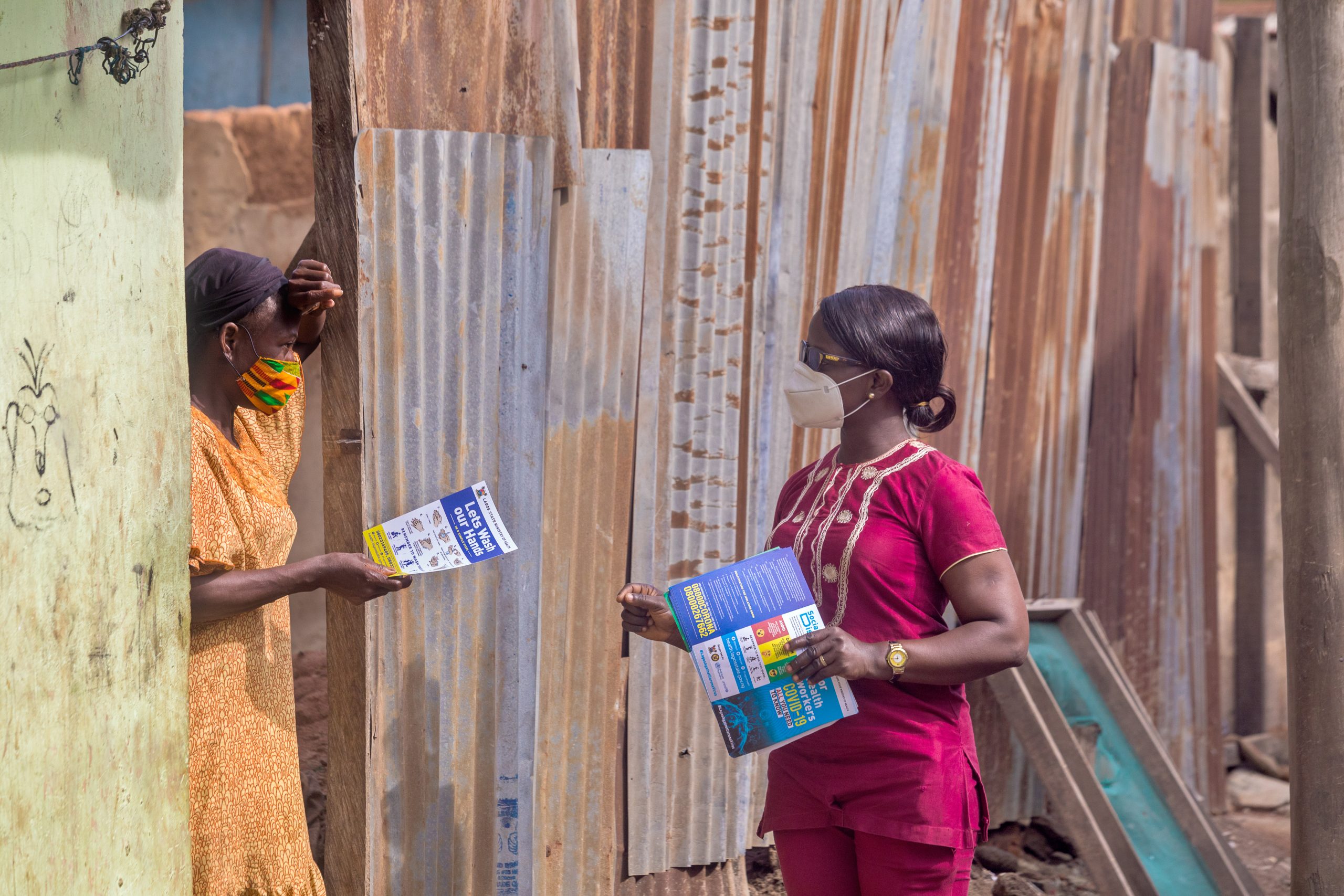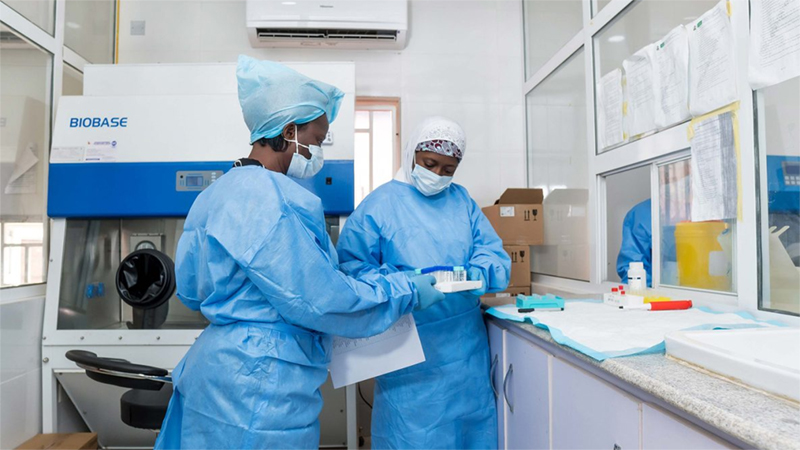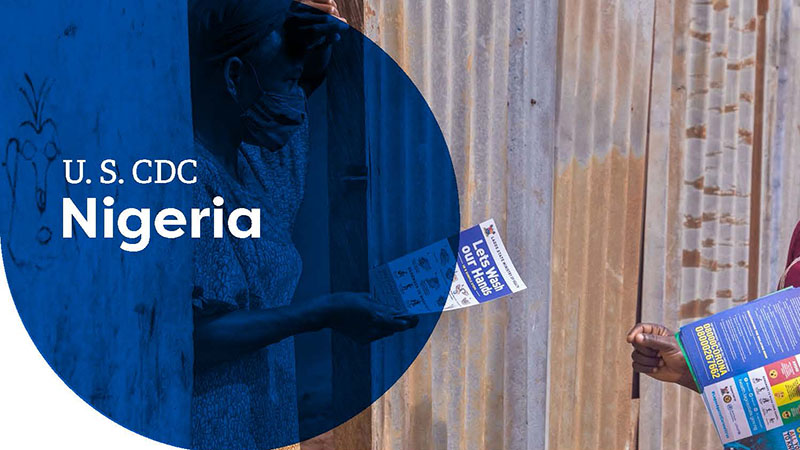At a glance
CDC works with the Federal Ministry of Health (FMOH) and other partners to build effective public health collaboration and partnerships, which strengthen the country's core public health capabilities: data and surveillance, laboratory capacity, workforce and institutions, prevention and response, innovation and research, and policy, communications, and diplomacy.

Overview

CDC established an office in Nigeria in 2001. CDC works with the Government of Nigeria and partner organizations to detect, prevent and control infectious disease outbreaks, and to build and strengthen the country's core public health capabilities. These include data and surveillance, laboratory capacity, workforce and institutions, prevention and response, innovation and research, and policy, communications, and diplomacy. CDC's work aims to protect the health of our nations and public health around the world.
CDC Nigeria supports the Global Health Security Agenda (GHSA), the U.S. President’s Emergency Plan for AIDS Relief (PEPFAR), and immunization efforts to help people live healthier, safer, and longer lives.
Global health security

In 2019, Nigeria became a GHSA partner country. CDC works with the Government of Nigeria and partners to achieve GHSA goals by strengthening surveillance, laboratory, workforce development, and emergency response.
Surveillance
CDC helped Nigeria enhance its national surveillance systems in response to COVID-19, mpox, and acute febrile illnesses. CDC supported the strengthening of surveillance at points of entry to prevent disease spread across borders.
Laboratory
CDC helped develop core laboratory diagnostic capacity to test for mpox, yellow fever, measles, Lassa fever, cholera, and cerebrospinal meningitis. These efforts helped strengthen Nigeria's ability to quickly detect and respond to outbreaks.
Workforce development
CDC helps train epidemiologists through the basic, intermediate, and advanced Field Epidemiology and Laboratory Training Programs. These epidemiologists work in relevant sectors of Nigeria's public health system, including outbreak responses.
CDC sponsored the Lassa Fever Clinical Management Fellowship in 2023 to improve clinical management of Lassa fever in Nigeria and decrease the number of infections in healthcare workers. Since graduation, the first cohort has provided case management support at healthcare facilities in states with the highest number of cases. This has led to a decrease in deaths from Lassa fever in the facilities where the fellows work.
Emergency response
CDC supported the establishment of national and state-level Emergency Operations Centers and trains emergency response staff through the Public Health Emergency Management training program. CDC collaborates with national and state governments and partners to support responses to outbreaks of mpox, Lassa fever, diphtheria, and many other diseases.
Key achievements
With CDC's support:
- Nigeria's Joint External Evaluation score rose from 39% in 2017 to 54% in 2023.
- Nigeria developed a national Public Health Emergency Contingency Plan, as well as 16 plans for priority points of entry. These plans aid preparedness operations and enhance response coordination.
- Nigeria's Centre for Disease Control became a National Public Health Institute (NPHI). The NPHI integrates public health functions, coordinates across sectors, and accounts for public health resources.
HIV and TB
As a key implementer of the U.S. President's Emergency Plan for AIDS Relief (PEPFAR), CDC plays an essential role in the fight against HIV and TB. With unmatched scientific and technical knowledge and long-standing relationships with ministries of health, CDC is uniquely positioned to advance HIV, TB, and other global health security activities that keep Americans safe at home and abroad.
Through PEPFAR, CDC provides critical support to Nigeria's public health infrastructure, improving the country's ability to prevent, detect, and respond to HIV, TB, and other infectious diseases and minimizing their risk from entering the U.S.
Malaria
Nigeria has the most malaria cases in the world, with young children and pregnant women being the most affected groups. CDC has collaborated with national and international partners to support implementation of malaria prevention and control in Nigeria since 2011.
Key accomplishments
Since 2011, CDC has helped provide:
- Nearly 83 million insecticide-treated bed nets.
- 22 million malaria preventive treatments in pregnancy.
- 164 million fast acting malaria medicines.
- Insecticide to spray 121,000 homes.
- Over 102 million rapid diagnostic tests for malaria
Vaccine-preventable diseases
CDC provides technical and programmatic expertise to eliminate or control vaccine-preventable diseases through immunizations. CDC works with international and local partners to strengthen immunization systems and expand routine vaccine delivery. This work helps prevent cases of infectious diseases such as polio and measles.
Key achievements
- CDC helped increased routine immunization coverage from 33% in 2016 to 57% in 2021. Unimmunized children decreased from 3.3 million in 2016-2017 to 2.2 million in 2022.
- CDC supported the introduction of the novel oral polio vaccine type 2 (nOPV2) in March 2021. By November 2022, more than 310 million children under five have been vaccinated.
- CDC supported the Government of Nigeria in introducing the HPV vaccine for girl ages 9-14. As of December 2023, more than 4.5 million girls had been vaccinated in 15 states with ongoing efforts to expand.
Infection prevention and control (IPC)
CDC helped set up the national IPC program and training curriculum within the Nigeria Centre for Disease Control and Prevention. They supported the Surgical Site Infection Surveillance Pilot at tertiary health facilities and its current scale up. In addition, CDC supported the development and pilot of the national IPC monitoring and evaluation tool to provide actionable data to help reduce morbidity and mortality related to healthcare associated infections.
Key achievement
- In collaboration with the Nigeria Centre for Disease Control and Prevention, CDC helped establish the Orange Network, a group of 41 tertiary health facilities that will serve as models for IPC programs in the country.
